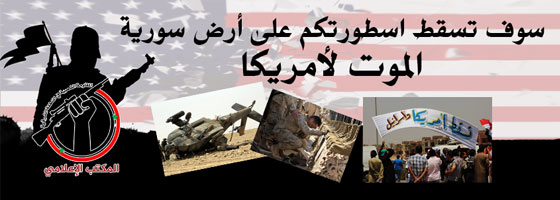On April 16, a protest in support of President Bashar al-Assad's regime and against the American presence in Syria broke out in the city of Raqqa, which is under the control of the Syrian Democratic Forces, who are backed by the United States.
Although the protest did not last more than a few minutes and did not have more than 50 participants, most of them women and children, it is an interesting event at a time in which general discontent is rising among residents at the destruction of their homes as a result of the military operations which the international coalition carried out against the Islamic State (ISIS) organization during the spring and summer of last year, without any promises or hope of compensation to help them rebuild and restore them.
The protest, which was no doubt instigated by a regime security cell, was preceded by other incidents, most prominently the announcement by the Al-Baqar Brigade, supported by the Iranian Revolutionary Guard, of the “start of military and jihad operations against the American occupation and those who ally with them in Syria,” according to a statement issued by the militia, as well as the announcement of the formation of a “popular resistance in the eastern region,” which has been active in recent weeks with a campaign to raise flags and write messages on walls in support of the regime and threatening the SDF and Americans in Raqqa.
These incidents and others indicate a transformation in the way the regime and its allies, the Iranians in particular and the Russians, are dealing with the American presence, and their taking the reins of initiative to change the map of control in the eastern area despite the failure that met their first serious attempt to do this with the failed attack in February on the gas treatment complex known as Koniko under SDF control, which was carried out by joint forces including mercenary fighters and regular “Russian” soldiers and Shia militias under the Revolutionary Guard with heavy fire support from the regime forces from the rear.
The statements of U.S. President Donald Trump about his intention to withdraw his forces have encouraged the regime and its allies to intensify their various activities against the Americans and the SDF and to increase their preparations to impose their authority on areas outside their control in Raqqa and Deir-ez-Zor provinces.
The exclusion of regime forces and their Iranian allies’ positions in Deir-ez-Zor from the list of military targets hit by the French-American-British strikes in punishment for the Ghouta chemical attack, did nothing but strengthen the regime and its allies' trust in their abilities to achieve their ambitions in eastern Syria.
It also strengthened their trust in the means and tools which they have adopted for that, making use of points of weakness suffered by the Kurdish Self-Administration, the ruling civilian body in the areas controlled militarily by the SDF.
Powerless Self-Administration
The Self-Administration has failed to appear independent from the influence of the Democratic Union Party (PYD), the Syrian extension of the Kurdistan Workers’ Party (PKK) in Turkey, and in dispelling concerns and doubts about it that it is merely a tool used by the PYD to achieve its secessionist aims.
It has not succeeded in changing the general perception around it that it is a project of Kurdish hegemony over Arab populations, who comprise the overwhelming majority in the Deir-ez-Zor and Raqqa provinces.
In the end it appears as an imposed foreign power, which people looking for a minimum of peace and security can live with until conditions change, when local communities regain their strength, after a long exhaustion because of the successive wars and crises since 2011.
Today, more than a year after the establishment of the Raqqa Civil Council and more than six months since the establishment of the Deir-ez-Zor Civil Council, the two local governing institutions established by the Self-Administration in the areas which it controls in the two provinces, it does not seem that the two councils are able, although to different degrees, to carry out the tasks assigned to them, which are to provide basic services to the people, repair damaged infrastructure and provide work and to get agriculture working.
On the military side, the plans of the Kurdish military commanders to turn the SDF into an army have vanished, and they have even failed to turn it into a cohesive and solid military body with the exception of the Kurdish units in it, which are no more than a military arm for the PYD.
Assassination or assassination attempts have been discovered against figures who have played or are playing public roles, especially in Raqqa province, in addition to a general security breakdown which has clearly appeared in Deir-ez-Zor with the major failure by the security agencies established by the Self-Administration.
The shortcomings and stumbling blocks, regardless of the various reasons, some of which the United States bears responsibility for, and some others of which the Self-Administration bears responsibility for, have contributed to a troubled state afflicting the area, and has weakened to a large extent the trust among residents in the emerging local government, and has made their ability to remain and withstand the growing threats by the regime and its allies subject to doubt.
This article was translated and edited by The Syrian Observer. Responsibility for the information and views set out in this article lies entirely with the author.


